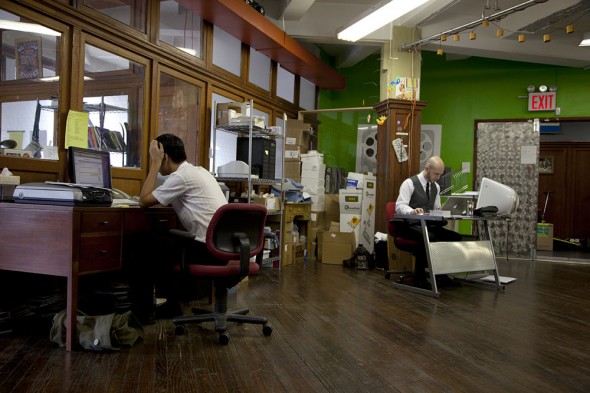
“Indie” is one of those words that gets thrown around with far too much frequency—what does it mean to be an “indie label” or an “indie production house”? Oscilloscope Pictures’ co-founders Adam Yauch and David Fenkel won’t define it for you, but they know what it means to them.
“Yauch saw the correlation between film studios and distributors, and the indie record labels he grew up around,” Fenkel explains. “He wanted to start a company with those companies in mind—the idea that all the creative is done in-house, and it’s not done with agencies, but with designers.”
A division of Oscilloscope Laboratories, Oscilloscope Pictures has a uniquely DIY attitude when it comes to film production. None of the work, whether it’s poster design or marketing, is outsourced. By hiring their own designers and collaborating on ideas, the company has been able to maintain complete control over their films. It doesn’t get much more independent than that.
For Fenkel, the in-house aspect of Oscilloscope is essential to their overall vision: it’s an important contrast to the cookie-cutter marketing of the larger studios. “We want our posters and our DVDs to be more a part of the film, and not just sales material,” he says. “All of our films are very original, and I think the artwork and the creative aspect has to be in line with that, versus, ‘Give me something similar to what you did with this other movie.’”
The story behind the company’s founding is worthy of an Oscilloscope release itself. Fenkel met Yauch, also known as the Beastie Boys’ MCA, when they financed and released the concert film Awesome; I Fuckin’ Shot That! The collaboration was a natural one for Fenkel, then the vice president of ThinkFilm, and Yauch, a longtime film devotee.
Two years later, in 2007, Yauch became passionate about making Gunnin’ For That #1 Spot, a documentary about the top high school basketball players. Doing that meant starting his own production company, and Oscilloscope was born. Together, Yauch and Fenkel continue to seek out the best and most original movies they can release. “We see films from all over the world,” Fenkel notes. “We see hundreds, if not thousands a year. It’s more of an art than a science…We kind of take it from a film fan perspective.”
While Fenkel acknowledges that there might be a certain stylistic link between Oscilloscope releases, he says it’s not necessarily a conscious choice. And the films are diverse—from heavy documentaries like Dear Zachary and Flow, to war drama The Messenger and avant-garde biopic Howl.
“Most of the films we see just aren’t for us,” Fenkel admits. “Oscilloscope films have a certain level of filmmaking, definitely, whether that’s a unique vision or a comedic sense or great storytelling. We’re drawn to movies that are untraditional in a commercial sense.”

Essentially, it’s a matter of quality over quantity—which makes sense when you consider how much work goes into each Oscilloscope release. Like Gunnin’ For That #1 Spot, the films the company picks are passion projects: Yauch and Fenkel are driven by a sincere love and obsession of cinema, particularly the complex, innovative films that might otherwise slip through the cracks. “The films that we choose have to have a lot going on that we really attach ourselves to and really love,” Fenkel says.
In his mind, Oscilloscope doesn’t actively seek out movies that might be described as “tough sells.” At the same time, Fenkel concedes that he and Yauch love a challenge. Because their tastes often fall outside of the mainstream, they end up with films larger studios wouldn’t touch.
And they’re still succeeding—as good a sign as any that smaller, untraditional films can work. They find their audience, as Fenkel puts it, and the quality speaks for itself. “No one believed in Wendy and Lucy,” he recalls. The Oscilloscope release ended up being a critical success, with some calling it Michelle Williams’ strongest performance. “We bought the film when we were two months old. We had not released a film yet. But we believed in it, and it’s an excellent movie. When you just kind of focus on that, it works.”
Oscilloscope’s commitment to good films means they only produce a limited number each year. The company continues to grow, but the overall goal is to get better—not bigger. “Adam’s always had this vision—he’s been around companies that have grown quickly and been too top-heavy,” Fenkel says. “It’s very important for us to grow when necessary. We end up growing because we have really talented, really smart people working hard.”
It follows that indie production houses like Oscilloscope Pictures would thrive in times like these, when overhyped trainwrecks (Sex and the City 2, anyone?) bomb with critics and audiences. The big studios don’t seem to learn from their mistakes—Fenkel points to the sheer number of terrible Katherine Heigl movies—so it’s up to Oscilloscope to pick up the pace. “The independent space is where you’re always creating firsts,” Fenkel says. “You’re always creating new ideas and new stories. And that’s what we want to get behind, the filmmakers who are doing that.”
– Louis Peitzman
photography by Ann-Sophie Fjelloe-Jensen

